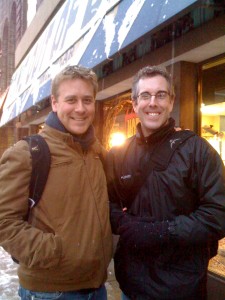Acts of Preservation: An Interview with Travis Holland
Travis Holland grew up in Florida and studied history at Georgia State University. His stories have appeared in The Quarterly, Five Points, Glimmer Train, and Ploughshares. In 2004 he graduated from the University of Michigan’s MFA Program. His first novel, The Archivist’s Story, which is set in Stalinist Russia in 1939, was published in 2007 by Dial Press and has been translated into eleven languages. The book has received accolades here and abroad, including the following: A Guardian Readers’ Pick of 2007, A Barnes and Noble Discover Great New Writers Award, a Best Fiction of 2007 choice by Metro.co.uk, A Best Book of 2007 by both the Financial Times and Publisher’s Weekly, and the 2008 VCU Cabell First novelist award. It was also nominated for the 2009 International Impac Dublin Literary Award. He currently lives in Ann Arbor, where he is at work on his next novel. Jeremiah Chamberlin spoke with him for Fiction Writers Review on December 18, 2008.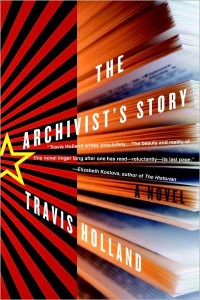
Special Note: The Archivist’s Story is currently a nominee for the Spread The Word/World Book Day Contest, which is a reader’s choice award. To vote for this book, or to see the other nominees in the fiction category, please visit this website. Voting ends January 1st.
Jeremiah Chamberlin: Let’s begin at the beginning. How did you come to writing?
Travis Holland: It was always important to me. From the time I was an early teenager—twelve, thirteen years old—I was writing stories, and I have pretty much been writing continuously since. The first stories I wrote really grew out of my reading. I was an avid reader, and when I would finish a story or book it wouldn’t be enough for me. So I’d write an extra chapter, or I’d write a story imagining the character I’d just read about doing something else.
Do you remember any of the first books you did that with?
Off the top of my head, no. I was reading a lot of Stephen King when I was quite young, so I did write an entire Salem’s Lot knockoff. I wrote a whole novel when I was fourteen.
So when you went to college were you pursuing writing?
I didn’t major in English. Writing was my first choice; writing was what I was going to do. But I thought that I needed to have something to fall back on, so I majored in teaching. I thought that a writer needed to know as much about as many things as possible—History, Sociology, Anthropology—so I studied broad field Social Studies, got a teaching degree, and I was going to teach History.
Once you’d finished with school, were you writing on your own? How did you begin to start doing that? Did you have mentors?
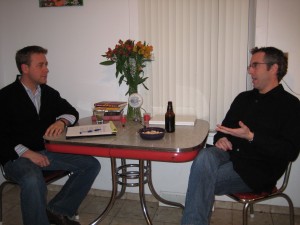 Yes. Yes. Funny that you ask. I didn’t know any writers because I wasn’t in the English department. So I didn’t know anyone who was doing what I was doing, which was trying to write stories. At Georgia State I just found myself one day walking the hallways of the creative writing department, desperately trying to talk to somebody. A writer there, David Bottoms, a poet, was nice enough to invite me into his office. I remember he said, “Who are you reading?” And I said, “Hemingway.” He said, “That’s good. That’s good.” Then I said, “Kerouac.” And he said, “Forget that guy.” (Laughs.) Of course, I was like, “What do you mean, ‘Forget that guy?'” And then, later on, as I got older, I realized you don’t want to learn how to write from Kerouac. Kerouac is after you know how to write, you know what I mean?
Yes. Yes. Funny that you ask. I didn’t know any writers because I wasn’t in the English department. So I didn’t know anyone who was doing what I was doing, which was trying to write stories. At Georgia State I just found myself one day walking the hallways of the creative writing department, desperately trying to talk to somebody. A writer there, David Bottoms, a poet, was nice enough to invite me into his office. I remember he said, “Who are you reading?” And I said, “Hemingway.” He said, “That’s good. That’s good.” Then I said, “Kerouac.” And he said, “Forget that guy.” (Laughs.) Of course, I was like, “What do you mean, ‘Forget that guy?'” And then, later on, as I got older, I realized you don’t want to learn how to write from Kerouac. Kerouac is after you know how to write, you know what I mean?
Well, there is such romance associated with that book.
Exactly. On the Road…I would put a bottle of wine in my book bag and go hop trains.
Really?
Literally.
Out of Atlanta?
Yeah, l would hop trains. I never got anywhere. Mostly I’d walk down the railroad tracks with my buddy, drinking wine. Or we would go do things like sit in the bus station in downtown Atlanta at three in the morning, or in cafes and diners, and I would be thinking that I was a character out of Jack Kerouac. But David Bottoms was really nice; he suggested that I take a creative writing class that he taught. I audited it, and it was a great experience. Then I graduated and kept writing. A big mentor, a person who was really helpful, was another writer at Georgia State who I met later, Pam Durban.
How did you find your way to her?
Again, I went to Georgia State. This was years after I’d graduated, so I was twenty-four or twenty-five, and I’d been writing on my own for quite some time. You can get very desperate, as young writers know. You just don’t know if anything you’re writing is good. I’d had a story published in The Quarterly. Gordon Lish published a story of mine when I was twenty-three, quite young, but it was like throwing a quarter up and having it land on its edge and someone saying, “Do that again.” At twenty-three I didn’t know how to do that again. A year or so after the story had been published, I again found myself at Georgia State because I was in Atlanta and that was the only place I knew to go. Pam Durban was nice enough to invite me into her office and sit down to talk with me. She didn’t know me. She said, “Maybe you ought to think about taking a graduate level workshop. Come sit in my workshop.” But when I tried to register for the class, they wouldn’t let me register because I wasn’t a student. So I thought, that’s that. Then, a week before the class started, she called me up and said, “Why aren’t you in my class? I see you’re not on the roll.” I told her what happened and she said, “Don’t worry about that—you’re in the class.” So I took a workshop with her, and it was a great experience. She’s a great teacher, a very kind woman. And that helped. It’s funny, my experience was that every four or five years I would have someone help me along. David Bottoms, when I was quite young; Pam Durban, when I was in my mid-twenties; and then, when I was thirty, it was the University of Michigan. You know that expression, writing in the cold? These were the folks who invited me in and let me sit by the fire for a bit to warm my feet, thaw my feet, and then sent me back out. That was invaluable for me at that time. Because if I hadn’t had those people help me along the way, I don’t know if I’d have made it this far.
You’re a boy who grew up in Florida and went to school in Georgia, yet you’re writing about Stalinist Russia. Was that history background what drew you to this topic?
Absolutely. Not only the background in history, but the discipline of the historian. Once you set your mind on a particular subject, the discipline of how you go about learning as much as you can about that subject. So for me that consisted of using both secondary and primary sources, and that was something I learned when I was studying history as an undergrad.
What was the catalyst that started this book? What set you down this path?
The first seed of the novel was Isaac Babel himself. He was in an anthology, his story “Di Grasso.” It’s a very short story about a young man from Odessa telling about his childhood, a sort of coming-of-age story. In typical Babel fashion, it’s just three or four pages and it’s literally brilliant. Line by line, it just leaves you trembling. I read the story and I had no idea who Isaac Babel was. I was probably twenty then. So I immediately turned to the back of the collection, thinking I’d discovered something. And I read his little biography and learned that he was a writer who wrote during the Soviet era. Not only had he written decades ago, half a century ago, but I learned that he’d been arrested during Stalin’s purges and vanished. His whereabouts were unknown. He vanished, possibly into concentration camp or gulags, and was never heard of again. So I had the strange experience of discovering him and losing him on the same page. And that resonated with me. Years later, I happened upon a book called Arrested Voices, which was written right after the fall of the Soviet Union by a Russian writer named Vitaly Shentalinsky. What he wanted to do was discover the fate of writers like Babel and Mandelstam, all these writers who vanished during the purges. So Shentalinsky bravely fought his way through the briars and thickets of KGB bureaucracy and got in there [The KGB archives] and found Babel’s file. There was this window after the wall fell—Perestroika—when Russians were opening up their archives and examining this past. And he found out that Babel had been arrested, that Babel had confessed to these ridiculous charges of being a Japanese and a German spy, and that he’d plotted to assassinate Stalin. He not only confessed, but also condemned others—he named names. Of course, Babel was beaten into confessing. He was tortured. He was kept awake for days
This is all in that file?
It’s all in that file. Of course, when they first questioned him he said, “No, this is a mistake.” But after several weeks of beating and torturing him, he would have confessed to murdering Trotsky or Abraham Lincoln, if you’d asked him. So he confessed like millions of other Russians did to ridiculous crimes, fraudulent crimes. So his fate was sealed, and he was eventually tried. He renounced his confession in an act of bravery. He renounced his confession in the last months of his life of 1939. He wrote letters to Beria, who was the head of the NKVD—what’s now the FSB. He wrote letters to everyone he could, including Stalin, saying, “In a moment of weakness, I confessed to something I didn’t do. Not only that, but what troubles me most is that I implicated others.” So he renounced those denunciations. And one of the things that struck me reading that was his concern for these manuscripts that had been confiscated when he was arrested. All these stories he’d been working on—mostly in silence for ten years in the 1930s—all these stories had been confiscated with him and they’d been seized as state’s evidence. And Babel’s primary concern at the end of his life, when he knew what was coming for him, when he knew he was doomed, his concern was that he wanted to get to those stories, he wanted to work on them. He wanted to finish them. So his last request in these letters, and his actual last request before the military tribunal that sentenced him to death, was to be able to work on his stories. Of course he never did work on those stories. Those stories were entered into evidence, or they were filed away or archived, and they were never seen again. When I read this book by Shentalinsky about what happened, just like reading Babel for the first time and that resonating or shaking me, this discovery that his stories had been lost—
Losing him again.
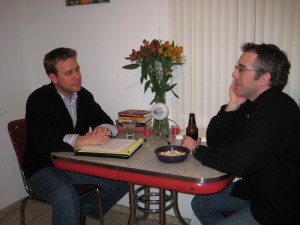
Exactly. Knowing that that story that I’d read all those years ago, that had such a powerful effect on me, the idea that that story could have been lost…I started imagining what happened to those stories. Then I had an image one day of a man hurrying home at twilight in Moscow, or what I imagined Moscow to look like at the time, with stories hidden in his coat. So I had this image of someone saving those stories.
This was the ember he was keeping alive, the Prometheus fire.
Yeah. I think it was my attempt, my way of wishing I could save those stories too.
The book is certainly an act of preservation, an act of salvation. I was also impressed by the risk a writer takes going into a project like this and saying, “This is Babel.” My guess is that one has to enter with a great deal of humility, and a great deal of trust and intuition. But certainly there must have been moments when you worried, or thought to yourself, “How do I get this right?”
Yes. That’s absolutely hitting it on the head, Jeremy, because I did feel both great humility and trepidation and a responsibility. I don’t think a day went by when I was working on this book that I didn’t say a little prayer to myself. A little prayer to the Gods who watch over us as writers. “Let me get this right.” It seemed to me so serious a duty.
How many years was this process?
Probably five years. It took me quite a while.
It took even longer than that if you go back to those original stories.
Exactly. It did have quite a hold over me. I did go in with the sense of trying to get it right. And I think that’s one of the reasons why I did a tremendous amount of research for this book. I read about aspects of Soviet history—the revolutions, the Civil War, things that never show up in my book. I immersed myself in the Bolshevik Revolution. I tried to understand this notion of what the revolution was about, what the revolution had promised. I write about 1939, which was a diminution of the worst years of the purges. The worst years of Stalin Soviet purges were when it became so bad that it nearly broke Russian society. Literally. There were no people to work jobs. 1937 and 1938 were the worst years. 1939 was after that madness. It was sort of the tail end. A brake had been put on. Stalin and some of his henchmen realized, “We can’t go on at this rate. We can’t arrest ten percent of our population. We can’t arrest all the engineers, all the professors.” They would have purges—they would purge the engineers, they would purge the professors, they would purge architects. And so what happened was that they didn’t have anyone to build new infrastructure, there was no one to teach anyone.
You’ll pardon my ignorance for not having read much in this time period, but what was the rationale behind that? Why were these taking place?
In a very practical sentence, Stalin realized that the best way to stay in power was to perpetually have an enemy. If you have an enemy, if you direct the eyes of your people outward toward an enemy, real or imagined, it’s very easy to control people. So from its origins, Bolshevism always had this notion of the enemy out there.
It’s a kind of distraction.
It is a distraction. And you’ll notice that not only in Stalinism, but in all totalitarian states, they always have an enemy. If your people are starving and your people are fearful, if they are standing in bread lines and they don’t have anywhere to live, give them someone to hate. There’s a line in my book: “For every wreck, a wrecker.” This term, “wrecker,” was very important in Soviet thinking. Anything that went wrong had a reason, had a culprit. If there wasn’t enough bread, it was because of the bourgeoisie counterrevolutionary forces out there who were trying to stop this great experiment, this wonderful Bolshevik Revolution. If the trains didn’t work, or the trains derailed, someone caused it. Nothing bad ever happens in Soviet society because we’re creating a perfect society. So it creates this culture of paranoia and blame. The purges grew out of this imaginary threat. Stalin played on people’s hatreds, he played on people’s darkest emotion, which is hatred of the other.
The writers, then, were natural targets because they were vocal? Or, because of their politics?
Because their status in Russian society was so prominent. Writers in Russia have always had a revered status. People read. People are always reading. It’s a culture that values its writers. There’s probably a Pushkin Street in every city in Russia. Pushkin is a God there. The writers, historically, have always been the ones to speak truth to power. Tolstoy, Solzhenitsyn…Gogol, Turgenev…These were writers who would tell Russians about themselves, the way writers do in our culture. So when the purges occurred, writers were natural targets.
Tell me about the trips you did for research. Do you speak Russian?
My first trip I didn’t speak much at all. The second trip I spoke enough to get around.
So the moment you were crossing the ocean, what were you thinking to yourself?
What am I doing? (Laughs.)
You’re about to land in Russia. You’re this young, hoping to-be-novelist with a few pages under his belt and you’re going to tromp around and write about one of the most dangerous parts of this culture. You’re going to knock on the door of the KGB and ask if you can interview them about all the writers that they’ve assassinated.
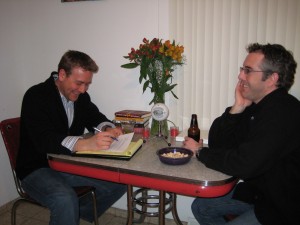
(Laughs.) Yeah. I didn’t quite do that. I did try to go to the Lubyanka, which is still there; it’s the KGB headquarters. These days the KGB has become the FSB. You’ll notice when you study Russian history that the name of the secret police has changed from the very beginning of the communist revolution. The only thing that hasn’t changed is that they’re still in that damn building. The same building that the Soviets took over during the Revolution. It used to be an insurance company’s building in downtown Moscow, but when the Bolsheviks came to power they nationalized all the businesses and took what they wanted. So they took this building in downtown Moscow in Lubyanka Square. They made that the headquarters for their secret police. If you go there to this day it’s still the headquarters of the secret police. They just changed the name of the institution.
Much of this book takes place in that building, in those basements where this archivist Pavel is toiling, literally. Were you able to get inside?
No. I was not. I was turned away at the door.
But you tried?
Oh, yes. In my ignorance I just thought I would walk in. I tried to walk in, I walked around the building and imagined. A lot of these descriptions that I write about inside the Lubyanka come from my research—KGB defectors, people who’d been arrested and had gone to prison and wrote about their experience.
Were you able to interview anyone who’d been there?
Yes. Through the generosity of the Andrei Sakharov Foundation, which is based in Moscow. They put me in touch with a number of Russian men and women who’d been arrested and sent to the gulags who were survivors of the purges. They were all in their late eighties and nineties. Every one of them was generous, encouraging, kind. They invited me into their homes and welcomed me and answered all my questions.
Did you work with a translator?
Yes, I had a translator. She was an extraordinary woman. I haven’t spoken with her in some time, but at the time she was an English professor. She taught English literature at Moscow University. This [working as a translator] was a way for her to make money and survive, because the salaries were so low. So she was my translator, driver, and bodyguard. She was just a tiny little lady. We called her The White Tornado because she wore this white fur hat. She’s a very diminutive woman and absolutely fearless. I’ve seen her walk up to Kremlin guards and she would just get us through. She would get us through lines, barricades, whenever. She’s a wonderful lady, Valentina.
Take me through this. You would go to someone’s apartment or home…How would you introduce yourself? “I’m an American who is writing a book.”
The Sakharov foundation had given me the names of people who were willing to talk to me. They’ve been told what I was doing, which is I was working on a project, doing research for a book. I would go to their apartments, their homes, their flats and invariably they would set out all this food. They would make tea, they’d set out vodka. You have to bring a present so I would always bring my little cake or whatever and we’d sit and they’d talk and I’d ask them all these questions about what life was like in the 1930s, what life was like when they were arrested, what their experience was like. I would just let them talk.
Did anything surprise you that you would have never expected when you got into that process? Or a particular individual who still stands out in your mind?
Yeah. Her name is Marina Nikanorovna Okrugina. She lived in a tiny little flat on the outskirts of Moscow, and she had been the secretary of a general in the 1930s. 1937 was the purges of the military. When Stalin started these purges he started with the military generals in order to clear the way. And when her boss was executed, she was arrested. She was married; she was in her early twenties; she had two babies. When she was sent to the Gulag she never saw them again. Ever. During the siege of Leningrad, her children died. They perished. She lost everything. She was sent to the gulag, to Kolyma. And she told me a remarkable story. She met a man there, a playwright. They would recite poems to each other. You have to remember: they’re in the Far East, in the middle of nowhere, with people dying in the gulags of starvation—it was the most dreadful conditions imaginable. They were worked to death. Yet they would give poetry recitals. They would get together and recite poems. I’ll never forget, she recited a poem from memory for me in Russian. And, of course, my translator, Valentina, translated, but it’s hard to translate poetry. She just started singing this poem, in a way, the music of the poem. It was so beautiful. We were in this dreary little apartment in Moscow as darkness was coming on, falling outside, with this 91-year-old woman with this light in her eyes, these beautiful eyes that you could see the younger woman that she was. All around us were pictures of her as a younger woman, and on the walls were all these pictures of people she knew, and she’s singing this poem to me. It was the most extraordinary moment. And then I left her apartment, and it’s cold, and we go out to Valentina’s car, and it’s dark—darkness has fallen, night has fallen—and she’s standing at the window looking at me. (Long pause.) I raised my hand to her, but I don’t think she saw me. Leaving her there was a very difficult thing.
You had a moment of pure human connection.
The interviews were very powerful. But that one in particular always stayed with me. I’ll never forget her standing at the window looking out.
It’s such a gift to say to someone, “Here’s this moment of my life.”
That was something I was conscious of as I was writing the book. There were so many people who perished during the purges, whose voices were lost and stories we’ll never know. I did feel a great responsibility to them. When you set out to write you’re setting out to do something that’s almost damn near impossible. The ideal is perfect, and then you start writing and it falls from there. The whole time that I was writing this book I was holding in my heart this promise to myself that I would do as well as I could with it. I would do as much as I could and get as close as I could to that ideal. Because it felt important to me. Every work of art is a failure, in a way. You have that ideal, and then you have what you end up with. But I think that ideal is what pulls us forward. You know what I mean?
“Fail again, fail better.” Who said that? Beckett, I think.
Exactly. Meeting the folks that I interviewed and that image of her standing in the window was not an abstraction. She was a real person I was writing for.
It’s easy to forget that, I think. One of the most haunting images in the book is the image of those loose sheaves in the fire. And for anyone who’s written or who aspires to write it’s devastating to imagine the amount of toil that went into those pages to disappear in an instant. But it’s also easy to forget about those individuals like her who haven’t chronicled their lives.
For most of us, much of our lives pass away when we pass away. A writer is the person who has saved it. To me, writing a book or a short story is proof that this life is lived. It is, in a way, saving these lives so that they don’t simply pass into nothingness. So when these manuscripts are destroyed, it’s like a double murder. The person is lost, and then all proof of that person existing is also extinguished. This is not to say that the writing is more important than the person; the writing is the reflection of the person, it’s their voice.
The British writer John Fowles believed that all great writers must have a philosophy, a world-view, something greater than themselves that drives their work. Specifically, he said, “I soon lose interest in novelists who do not show their prejudices and opinions, who do not try to sell me something beyond entertainment, wit, clever technique, exquisite prose…not that those aren’t added pleasure.” Is this notion of “preservation” the over-arching goal of the book, and also was that something you came to discover during the process of the writing or was it something that drove you to the writing?
Both. The architecture of this novel is the idea that I just laid out of what literature is. Literature is the breath—Babel’s breath—on the glass. Literature is that breath, that fog. It is the proof that life was there. This was something I came to realize that was there all along. The idea that I could pick him [Babel’s stories] up and feel the life of this human being or these characters on the page and then have to realize that he was gone and that the stories were gone, why that seemed so terrible to me, why that would stay with me through the years and drive me to write this book, was something that was perhaps unarticulated. I hadn’t told myself exactly why I felt that way, but it drove me to ask these questions. And the writing of this book was me answering that question for myself. Do you know what I mean?
I do, yes.
Because during the writing of this book I would ask myself, “What does this mean? What are these stories? What are books?” I would be looking around me at the books on my shelves and the stories I would be reading, and I would ask myself, “What do they mean to me?” The Archivist’s Story is me answering that question for myself.
What about Pavel? He is clearly the hero of the novel—that man whom you envisioned walking down the street with the story hidden in his belt—yet he is also a collaborator. By no means am I suggesting that our characters need to be good or admirable. In fact, the best characters rarely are; they have to be complex. Yet I’d be curious to know how you judge him.
In the end I see Pavel as a forgivable character. He is redeemed by this fact in the end. Obviously he has moments of weakness where he allows himself to be drawn into the denunciation of one of his colleagues, which has disastrous consequences. I tried not to judge him harshly because the more you learn about this time the more you realize that everyone was drawn in to these purges. I see Pavel as a human being not particularly weaker or stronger than the average person. So he acts out of fear and desire when he allows himself to denounce his colleague; he does it for reasons that I can imagine any of us doing.
Do you see his work at the Lubyanka as a kind of purgatory or penance?
Well, quite practically, when he gets pulled in to the Lubyanka it’s an offer he can’t refuse. Your options at that point are either to die or do it. But what I do see is a kind of purgatory for what happened with his colleague. The novel starts with him in a hole, in a sense, that he’s dug for himself, and then trying to climb out. So saving Babel’s stories is an act of redemption.
Along these same lines I’d like you to talk a little bit about protocol and bureaucracy. The state seems to affect everything from whether a person can tell a joke in a restaurant or not, to how frank a mother can act around her son. This atmosphere is so pervasive it almost feels like a character in the book at times.
Paranoia and the fear that people felt was very real. In a time when people could be arrested for absolute nothing, you certainly could be arrested for telling an off-color joke about Stalin. The poet Osip Mandelstam famously recited a poem he’d written about Stalin at a party, where he mocked Stalin’s mustache, comparing it to a cockroach. That poem became infamous. When he was arrested, the police were asking him about that poem. They made him re-create it. This was a poem that he hadn’t even written down; he’d just made it up and read it at a party, a drunken party with a bunch of writers. Of course someone heard and they found out. But can you imagine the moment after he told that poem at this party? The silence? People leaving the room, the looks he must’ve gotten…When he was arrested he was asked, “What about this poem? You compared Stalin’s mustache to a cockroach. You said he had oily fingers, fingers like fat worms.” That was enough to get you killed, and it did. Mandelstam died of typhus in a concentration camp.
So the fear was very real.
It was tremendously real. You didn’t know who you could talk to, who was listening, or how your words would be interpreted.
Has the book been published yet in Russia?
No. Though it’s been published in Bulgarian and Romanian and Polish, so it’s closing in. It’s getting close. I’d be curious to know how Russians would react to this story. Right now it’s anyone’s guess.
This reminds me of E.M. Forrester. When he was commenting on the responses of readers to his novel Where Angels Fear to Tread, he wrote, “Italian friends who have read the book say that I have not done so badly. If that is true I am indeed proud. One of them, a charming girl, added that I must not think Gino is a typical Italian. There is not much danger of my doing this, since I do not think anyone is a typical anything. I am a novelist and my business lies with individuals, not with classifications.”
Yeah. You hear so often about—and it’s rather tiresome, in a way—the “Russian” character. The Russian Character. Yes, there are cultural differences. But a lot of cultural differences are a conglomeration or an accretion of history, what a particular country or people have gone through. It’s not that people are naturally inclined to be one way or another. But if you get hit enough, you become a certain way. The Russians have gone through the ringer, historically. They’ve had the Russian Revolution, and World War I, which was tremendously difficult. Russians had slavery until the mid-1800s. Russians enslaved one another. It wasn’t what we had here in the States, based on race; there it was based on poverty. But about the time we emancipated African Americans in this country, serfdom was abolished in Russia. Russians have a history of long suffering.
Well, I’ll be excited to hear what the Russian reader thinks of it when it becomes published in that language. Until then, I’d be curious to know what you’ve heard or what your feeling has been about the overseas audience.
It’s been quite well received overseas, in particular the UK and France. European readers perhaps felt slightly different about this book. It seems to hit closer to home in a way. Here in the States that ocean insulates us from a lot of what happens in the rest of the world. When you go to Europe, their eyes are often looking toward their neighbors in a way that we don’t. Our concerns are often inward. We pay attention to different aspects of the world insofar as how it affects us. In the States, the reviews [of the book] would often be part history. Whereas often in the UK, the review would assume that people knew this. They knew the history. They knew the context. But the response—wherever it’s been, in the States or overseas—has been extraordinary. It’s been very gratifying.
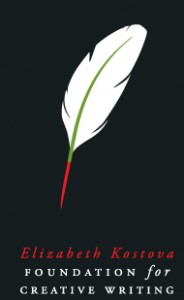 Last May you were invited to attend the Sozopol Fiction Seminar in Sozopol, Bulgaria, on the Black Sea. This conference is sponsored by the Elizabeth Kostova Creative Writing Foundation, which was founded to help create an intellectual and creative exchange between Bulgarian writers and their English-speaking counterparts. I’d love to hear a little bit about that experience.
Last May you were invited to attend the Sozopol Fiction Seminar in Sozopol, Bulgaria, on the Black Sea. This conference is sponsored by the Elizabeth Kostova Creative Writing Foundation, which was founded to help create an intellectual and creative exchange between Bulgarian writers and their English-speaking counterparts. I’d love to hear a little bit about that experience.
That was a wonderful experience from start to finish—getting to meet Bulgarian writers, getting to spend time with them, and getting to do this in Sozopol, which is an absolutely gorgeous town. When we pull up to the hotel it’s a beautiful little hotel right on the blue waters of the Black Sea. And there’s Elizabeth, standing with her arms open. It was a great event. They kept us quite busy—we had workshops in the morning, then readings and roundtables all day. It went from nine o’clock in the morning until nine o’clock at night. And we had great meals together. I know that for the Bulgarian writers, a lot of them had never even taken workshops. This was new for them. They were quite excited about it.
In the States we sometimes complain that writers are underpaid, or that they’re not recognized, yet when you travel abroad and realize that a country like Bulgaria has no MFA programs, no scholarships, no journals or periodicals, no fellowships, no NEA foundation…Well, you said at the beginning of this interview that you spent your early years writing in the dark, so to speak, and that a place like Michigan helped you “warm your feet by the fire.” This, then, truly is a remarkable opportunity for people who don’t have the same resources that we have here.
Absolutely. What Elizabeth Kostova has done is an amazing thing. It’s hard to appreciate how important it is until you go there and meet these wonderful Bulgarian writers. You learn something about what the state of writing is, how difficult it is to make a living in Bulgaria. The writers that Elizabeth had invited to teach her classes and to speak and to give readings were the premier writers of Bulgaria. Yet in Bulgaria they might get a $1,000 advance on their book. These were authors who had best-selling books and popular plays, yet they still had jobs in teaching or publishing. Anything to make ends meet. Because they simply didn’t have the opportunities that writers in the states get. And this was for the writers who were famous. The young writers, the aspiring writers invited to this seminar, had much less. So to be invited to spend these four days doing nothing but talking about writing, meeting writers, connecting and networking with writers, and doing it all in this beautiful place with beautiful meals and beautiful company was great.
Is your next project also going to have an international angle, or will it be something entirely different?
I’m working on something set in the States. So it’s…[long pause]
Not set in Russia. You’ll say that much.
I’ll say it’s not set in Russia. We’ll see.
The last question I’m going to ask you is one that I’m going to borrow from my friend Dan Wickett, who is the founder of the Emerging Writers Network. He always poses this question to his interviewees, and since your book is so interested in preservation—particularly the preservation of literature—it seems even more suited for our conversation. The question is this: If you were a character in Fahrenheit 451, which book would you memorize for posterity?
Oh, my God. (Long pause.) What book would I memorize for posterity…
If you were able to save one text to be called upon in the future to re-create…
That is so difficult. The first book that came to mind was Anna Karenina. I couldn’t pick a small book, right?
Assuming you could memorize the book, what would you like it to be? What book would you save?
Someone else would save Anna Karenina and Moby Dick. Those are books that come to my mind, and I would love to save those books. But I would probably like to save a book that a lot of people don’t know. So I would probably save The Collected Stories of Isaac Babel. Somebody else is probably going to get Anna Karenina because you don’t have to worry about Tolstoy. The first chapter of my book ends with him [Pavel] thinking about Tolstoy and comparing it [Babel’s last days] to how different it was when Tolstoy died. When Tolstoy died they shut down the trains, people packed the trains just to get a glimpse of him. When Babel died, there was no one there. And so Tolstoy’s got it covered, in a way. I would save Babel’s stories.
Thank you, Travis. It’s been a pleasure.
Thank you, Jeremy. I appreciate it, brother.


